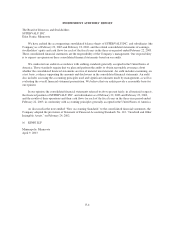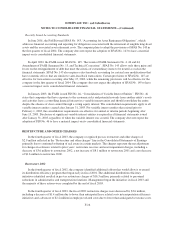Albertsons 2003 Annual Report Download - page 49
Download and view the complete annual report
Please find page 49 of the 2003 Albertsons annual report below. You can navigate through the pages in the report by either clicking on the pages listed below, or by using the keyword search tool below to find specific information within the annual report.SUPERVALU INC. and Subsidiaries
NOTES TO CONSOLIDATED FINANCIAL STATEMENTS—(Continued)
Comprehensive Income:
The company reports comprehensive income in accordance with SFAS No. 130, “Reporting Comprehensive
Income”. Comprehensive income refers to revenues, expenses, gains and losses that are not included in net
earnings but rather are recorded directly in the Consolidated Statements of Stockholders’ Equity.
Use of Estimates:
The preparation of consolidated financial statements in conformity with accounting principles generally
accepted in the United States of America requires management to make estimates and assumptions that affect the
reported amounts of assets and liabilities and disclosure of contingent assets and liabilities at the date of the
financial statements and the reported amounts of revenues and expenses during the reporting period. Actual
results could differ from those estimates.
Reclassifications:
Certain reclassifications have been made to conform prior years’ data to the current presentation. These
reclassifications had no effect on reported earnings.
New Accounting Standards
Recently Adopted Accounting Standards
In June 2001, the FASB approved SFAS No. 142. SFAS No. 142 requires companies to cease amortizing
goodwill and test at least annually for impairment. Amortization of goodwill ceased on February 24, 2002, at
which time goodwill was tested for impairment. Each of the company’s reporting units were tested for
impairment by comparing the fair value of the respective reporting unit with its carrying value. Fair value was
determined primarily based on valuation studies performed by the company, which considered the discounted
cash flow method consistent with the company’s valuation guidelines. The company performed the second
annual impairment test as of December 28, 2002 using the same methodology described above. As a result of
impairment tests performed, the company recorded no impairment loss.
In August 2001, the FASB issued SFAS No. 144, “Accounting for Impairment or Disposal of Long-Lived
Assets”. The company adopted the provisions of SFAS No. 144 effective February 24, 2002. SFAS No. 144 did
not have a material impact on the company’s consolidated financial statements.
In June 2002, the FASB issued SFAS No. 146, “Accounting for Costs Associated with Exit or Disposal
Activities”. SFAS No. 146 addresses financial accounting and reporting for costs associated with exit or disposal
activities and nullifies Emerging Issues Task Force (EITF) Issue No. 94-3, “Liability Recognition for Certain
Employee Termination Benefits and Other Costs to Exit an Activity (including Certain Costs Incurred in a
Restructuring)”. SFAS No. 146 requires recognition of a liability for the costs associated with an exit or disposal
activity when the liability is incurred, as opposed to when the entity commits to an exit plan as required under
EITF Issue 94-3. SFAS No. 146 was effective for exit or disposal activities initiated after December 31, 2002.
The company did not initiate any new exit or disposal activities subsequent to December 31, 2002. Accordingly
SFAS No. 146 did not have a material impact on the company’s consolidated financial statements.
In December 2002, the FASB issued SFAS No. 148, “Accounting for Stock-Based Compensation—
Transition and Disclosure”. SFAS No. 148 amends SFAS No. 123, “Accounting for Stock-Based Compensation”
to provide alternative methods of transition for a voluntary change to the fair value based method of accounting
F-14
























